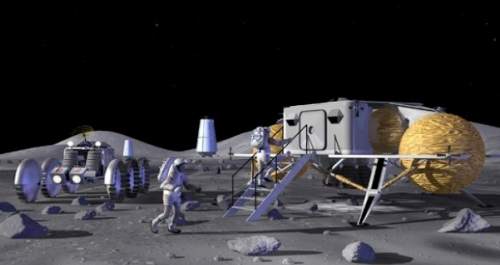The Russian Space Agency (Roscosmos) has suffered a string of embarrassing space-related debacles over the past few months.
The most notable failures? The infamous loss of the Phobos-Grunt probe slated to survey a Martian moon, the disintegration of an unmanned ISS-bound space freighter and several satellite crashes.

But Roscosmos chief Vladimir Popovkin doesn’t appear to be particularly concerned over the above-mentioned incidents.
No, Popovkin is apparently looking towards the future, as Moscow now believes it is ready to build a manned research base on the moon.
“We don’t want the man to just step on the Moon,” Popovkin told Vesti FM radio station in an interview transcribed by RIA Novosti.
“Today, we know enough about [the moon], we know that there is water in its polar areas.”
According to Popovkin, Roscosmos is currently “discussing how to begin [the Moon’s] exploration with NASA and the European Space Agency.”
There are two options supposedly being considered in Moscow: building a base on the Moon or launching a station in orbit around it. The moonbase idea – if implemented – would effectively resurrect Cold War-era plans formulated in the glory days of the Soviet Union which envisioned a permanent Russian presence on the moon.
Of course, it is quite difficult to take anything Popovkin says seriously, as the Russian space program is in serious trouble.
Indeed, following the recent crash of ISS-bound space freighter, Roskosmos deputy director Vitaly Davydov acknowledged that Moscow might have to roll back at least some of its aspirations for the final frontier.

“Perhaps in the future, we will not need a constant manned presence in lower Earth orbit [like the International Space Station],” said Davydov.
“We don’t exclude the possibility of returning to the concept of DOS (long-term orbital) stations that we had before stations with constant human presence.”
As Davydov noted at the time, classic Soviet-era space station designs, which included the Salyut, served as a base for incoming ships, and were not meant to act as permanent structures.
Davydov’s comments, while not entirely unexpected, clearly marked the end of an era during which both the United States and Russia placed an emphasis on maintaining manned space flight capabilities. To be sure, the US recently retired its shuttles, leaving the future of manned space exploration to private companies like SpaceX.
It is therefore highly unlikely that either the (bankrupt) United States or Russia will be building a permanent moon base anytime soon. However, China, which recently launched the Tiangong 1 (Heavenly Palace) research module into orbit, will likely have the motivation, resources and technology to do just that in the near future.






